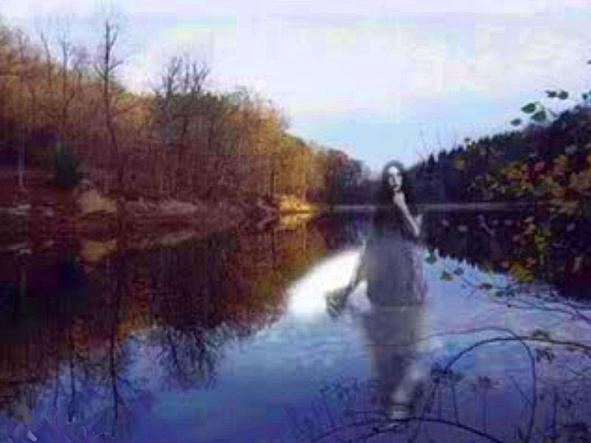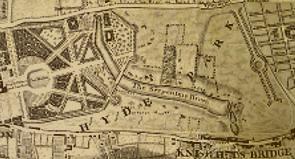The Ghost of Harriet Westbrook
How desperate must you want to die to walk into a freezing cold lake
in the middle of an English winter. Who was
Percy Bysshe Shelley?



"I never could refuse you and if you had never left me I might have lived."
Harriet Westbrook
Percy Bysshe Shelley's first wife, Harriet Westbrook, was born on 1st August 1795 the daughter of a Grosvenor Square coffee house keeper. She attended a school for girls in Clapham where she befriended 12 year old Helen Shelley, the younger sister of Percy Bysshe Shelley. Although the adolescent friendship between Harriet and Percy was initially encouraged, when the couple eloped to Scotland just weeks after her sixteenth and his nineteenth birthday in 1811 both families expressed surprise and consternation.
From Scotland the honeymoon couple journeyed together along with Harriet's 30 year old elder sister Eliza and a servant by the name of Dan Healy first to Dublin, then on to Wales before being joined by a friend Elizabeth Hitchener and settling in Lynmouth during the summer of 1812 at Mrs. Hooper's Lodgings at Woodbine Cottage.
By now Harriet had happily involved herself in her husband's various literary and political projects writing to a friend of Lynmouth,
"...the beauty of it has made us residents here for the summer months..." and "...It combines all the beauties of our late residence with addition of a fine bold sea. We have taken the only cottage there was, which is most beautifully situated, commanding a fine view of the sea, with mountains at the side and behind us. Vegetation is more luxuriant here than in any part of England. We have roses and myrtles creeping up the sides of the house, which is thatched on top. It is such a little place that it seems more like a fairy scene than anything in reality. All the houses are built in the cottage style. I suppose there are not more than 30 in all. We send to Barnstaple for everything, and our letters come but twice a week. It is 18 miles from here, therefore we ought to be able to manage very well on a horse to get there. We have an immense precipice to descend into the valley about 2 miles in length which no carriage can come down. It seems as if nature had intended that this place should be so romantic and shut out from all other intercourse with neighbouring villages & towns..."
Lynmouth provided the right atmosphere, here Harriet and Percy Bysshe were happy together, they would never again recapture these early sunny days, as it would not be long before Autumn beckoned and as Harriet wrote
"... we think of going to London for the winter...".
With their return to the capital Eliza's residence with them on honeymoon had become a source of friction and it was not long before Percy Bysshe was gone from home for long periods meeting with the likes of the radical intellectual and liberal thinker William Godwin and his circle. Still, in March 1814 Harriet and Percy Bysshe were remarried in church so as to legitimize their union according to English law and provide legal protection for the daughter Ianthe born in the previous June.
As the year wore on, however, relations between the two deteriorated seriously, and he came to regret the impulsiveness of his marriage. It was in this state of frustration and emotional duress that he meet William Godwin's sixteen year old daughter Mary. Harriet begged him to return, but he refused. Soon the two had fallen in love and in July 1814 they fled to the continent and for the ensuing six weeks toured France, Switzerland and Germany. Upon their return Mary was pregnant and to complicate matters further on the 30th November 1814 Harriet gave birth to their second child, a son named Charles.
In so confused a family situation Harriet's unhappy, though not impossible situation seemed clear. With her marriage her father had settled £200 a year on her and Percy Bysshe gave her a further £100 which was doubled by the new year with the death of his grandfather.
Financially secure, yet clearly extremely unhappy with the failure of her marriage, Harriet returned to live with her father for a time before taking lodgings in the late summer of 1816 under the name of Harriet Smith. She had taken several lovers, some say even resorting to prostitution, before becoming involved with a officer based at Chelsea Barracks, she had moved to her lodgings in Hans Place, Knightsbridge to shield her family from the resulting pregnancy out of wedlock.
By early winter Harriet was quite desperate and having not come to terms with the break-up with Percy Bysshe, she wrote a despondent farewell to her father, her sister and her husband before taking the short walk from her lodgings to Hyde Park.
"My dear Bysshe, let me conjure you by the remembrance of our days of happiness to grant my last wish. Do not take your innocent child from Eliza who has been more than I have, who has watched over her with such unceasing care. Do not refuse my last request. I never could refuse you and if you had never left me I might have lived, but as it is I freely forgive you and may you enjoy that happiness which you have deprived me of."
How desperate must you want to die to walk into a freezing cold lake in the middle of an English winter. On the 9th day of November 1816 Harriet disappeared, a month later on the 10th of December her body was found, she had committed suicide by drowning in the Serpentine at Hyde Park. On 12 December a short item was published in The Times newspaper,
"On Tuesday a respectable female, far advanced in pregnancy, was taken out of the Serpentine river and brought to her residence in Queen Street, Brompton, having been missed for nearly six weeks. She had a valuable ring on her finger. A want of honour in her own conduct is supposed to have led to this fatal catastrophe, her husband being abroad".
She was identified as a Harriet Smith and the verdict was
"found drowned", at the time of her death she was just twenty-one years old. During her brief and so tragic life Harriet was said to have been only truly happy during those early sunny days on honeymoon at Lynmouth during the summer of 1812. It is claimed that the ghost of Harriet Westbrook walks the hotel in search of those long lost days spent with her great love Percy Bysshe Shelley.